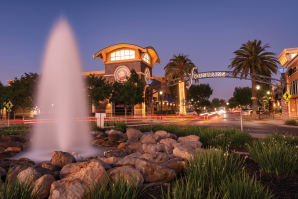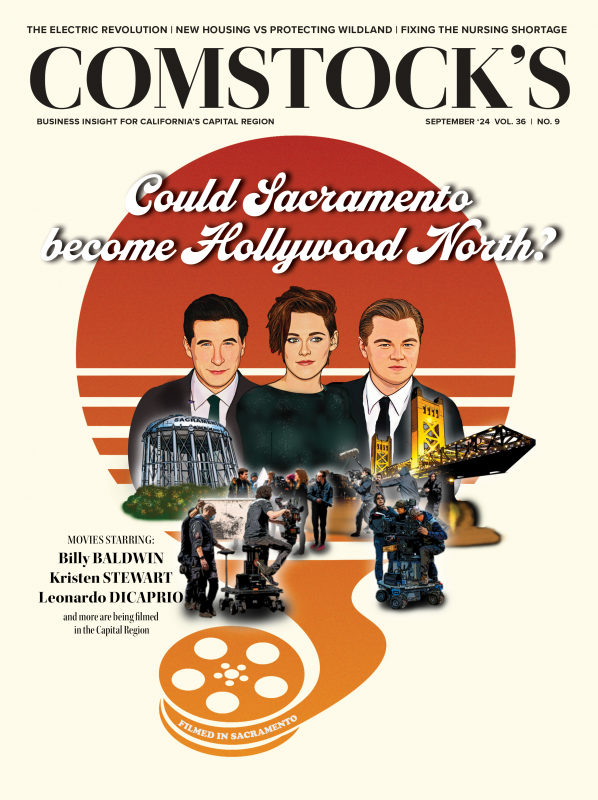For several days this winter, Sacramentans got to play “Spot the Movie Star” while Leonardo DiCaprio and William Baldwin were both in town filming two different movies at locations all over the city. Leo in a suit and ponytail standing outside the courthouse on 9th Street! Billy eating dinner at Paragary’s!
It was a bit unusual to have two feature films — “BC Project” (the working title of the DiCaprio movie) and Baldwin’s “No Address” — shooting simultaneously in what was once known as a stodgy government town. But what many people don’t realize is that the Capital Region is actually home to a robust and growing film industry that brings millions of dollars and thousands of jobs into the region.
Sharp-eyed moviegoers can spot local landmarks in numerous movies. Homegirl Greta Gerwig famously filmed her quasi-autobiographical “Lady Bird” here in 2016, introducing the world to the McKinley Park rose garden, the Tower and Crest movie theaters and Thrift Town. Parts of the 2022 Tom Cruise blockbuster “Top Gun: Maverick” were shot at and around Lake Tahoe Airport. Several scenes in Johnny Knoxville’s 2013 movie “Bad Grandpa” were filmed around town, including on the Jibboom Street Bridge.
Jennifer Stolo, CEO and producer of Robert Craig Films, with
Sacramento filmmaker Robert Craig on the set of the “No Address”
movie, which takes an in-depth look at homelessness in America.
The film was shot in Sacramento and Placer counties. (Courtesy of
Robert Craig Films)

The City of Sacramento and nearby Placer and El Dorado counties work actively to entice filmmakers to bring their movies here. Each jurisdiction has its own film office with a full-time commissioner who markets her area (they all just happen to be women) to producers of film and media, a broad category that includes feature and independent films, documentaries, TV movies and specials, scripted and reality TV shows, commercials, music videos, corporate and industrial videos, public service announcements and print ads.
First, a bit of background: In 1985, Gov. George Deukmejian created the California Film Commission to encourage film, TV and commercial producers to remain in the state, rather than move production to another state or country where costs are lower. Numerous California localities followed suit, and there are now nearly 60 film offices across the state. To compete with states like Georgia, which spends more than $1 billion annually to subsidize the film industry, California also offers filmmakers a 20-to-30 percent tax credit to stay here. Still, so-called runaway productions cost the state of California nearly $8 billion a year in lost economic activity, according to a 2022 report released by the Motion Picture Association.
A film office is often an offshoot of a city’s or region’s economic development department. Its main job is to bring money to the area. Film commissioners help producers with things like permitting, finding locations, booking hotel rooms, hiring crew, closing roads and the like. In 2023, Sacramento realized $2 million in economic impacts from film and media, while Placer County saw more than $5 million. El Dorado County typically receives between $1 million and $6 million annually in economic benefits. By the halfway point of 2024, Sacramento had already reported $5.9 million in local spending, almost all of it from the DiCaprio film.
That money trickles through the economy in all sorts of ways. Hotel rooms and on-set catering are obvious income generators. But as El Dorado film commissioner Kathleen Dodge points out, that just scratches the surface. Production companies also pay local doctors to do medical checks for the cast and crew. They hire local contractors to build sets and local haulers and trash collectors to take them away. If a script calls for a wintry backdrop, a local company gets paid to make faux snow. And every out-of-town union crew member receives a per diem payment for expenses. “Their paycheck goes home,” Dodge says, “but they spend that per diem locally,” often at restaurants and bars.
Los Angeles is still the epicenter of American filmmaking, but the Capital Region has become increasingly attractive to out-of-town filmmakers. In a bit of wishcasting, some folks here have even begun referring to Sacramento as Hollywood North. (It’s almost like they’re trying to make “fetch” happen.) The cost of doing business is often lower — everything from government permitting to location rentals — and the ease of doing business is often greater.
Last year, Hollywood producer Chris Abernathy found himself in town for a few days working on the movie “Sacramento,” a yet-unreleased buddy comedy starring Michael Cera and Kristen Stewart. It was, he notes, a surprisingly pleasant experience. “I have become very jaded shooting in LA,” he explains. “To get a permit to film in a house there, we needed two police officers, three film monitors and a fire marshal, which all came out of our budget. By contrast, Sacramento was really great. They were excited to see us.”
Successful films can now be shot anywhere, so why not Sacramento? Unless you have a story that specifically has to be set in LA, there’s no reason to be there. Mark S. Allen, ABC 10 entertainment anchor and filmmaker
Local film commissioners can be particularly useful to filmmakers in cutting through permitting red tape. Jennifer West, who became Sacramento’s first full-time film commissioner in 2020, definitely earned her paycheck on the DiCaprio film, a big-budget Warner Bros. thriller directed by Paul Thomas Anderson. Because the shoot featured risky stunts, including car crashes, explosions and a helicopter chase down J Street, she had to get sign-offs from multiple city departments — fire, police, engineering, public works, parking — as well as coordinate with numerous downtown businesses. For a scene on Tower Bridge, filming took place on Super Bowl Sunday, when downtown was mostly deserted, with local police stopping traffic on the bridge and nearby streets every few minutes for each new take.
What makes the Sacramento region so appealing to filmmakers? One big selling point, according to Juli Johnston, the film liaison for the Placer County Film Office, is its stunning and diverse landscape. Sacramento really is close to everything: lakes, rivers, mountains, snow, vineyards, orchards, farms, you name it.
Stan Bautista, a freelance location scout based in Sacramento, got a call from the makers of the recent Netflix film “A Family Affair” starring Nicole Kidman and Zac Efron. The rom-com had been filmed largely in an Atlanta studio, and they needed shots of trees, mountains and snow to give the film some verisimilitude. “They wanted the real thing. We’re the real thing,” says Bautista, who recommended Camino in El Dorado County. The region also offers a vast array of architectural styles, from Old West to mid-century modern. Onscreen, Sacramento can pass for Anywhere USA, says David Weber, an Oakland-based location scout. “I can do a Midwestern look in the Fab 40s,” he says.
The region’s film commissioners assist filmmakers by providing referrals to local services such as vintage car rentals, catering, prop houses and lighting companies. During the pandemic, local COVID-19 testing services were in high demand. To help filmmakers find shoot locations, all three local commissions offer digital location libraries. The El Dorado County Film and Media Office website displays photos of private homes as well as airports, barns, bridges, cabins, churches, docks, forests, hotels, restaurants, diners, lakes, meadows, mines, old-timey post offices, even a scientific laboratory, all available to rent. (See sidebar, “Your House Oughta Be in Pictures.”)
In a sign that Sacramento is becoming a filming destination, a growing cadre of film professionals now call Sacramento home, including casting directors, location managers, camera operators, gaffers, boom operators and prop masters. “No Address,” a feature film about homeless “street families” starring Baldwin, Ashanti and Beverly D’Angelo, was made by local film company Robert Craig Films using a local crew, a local casting agency and hundreds of local extras.
Robert Craig Films is the first Placer County film production company to get national distribution. The “No Address” film brought in $3 million in economic impact to the region.
“Sacramento” is a buddy movie about two young men taking a road
trip from Los Angeles to Sacramento. From left to right, actors
Maya Erskine, Michael Angarano, Michael Cera and Kristen Stewart.
Parts of the movie were filmed in Sacramento, including Gunther’s
Ice Cream Parlor and the Torch Club. (Photo Courtesy Wonder
Company)

“We were surprised at how much of the crew we were able to find here,” says producer and company CEO Jennifer Stolo. “We thought we would have to reach out to LA for crew. There’s so much more talent now because films are being produced here.” (The book version of “No Address” will be released Sept. 10.)
Local film professionals have their own organization, Capital Film Arts Alliance, which offers networking, workshops, a screenwriters lab, classes and an annual film competition. The group recently offered a free production assistant course to 40 students to prepare them for entry-level filmmaking positions. After passing the accredited course, some were immediately hired to work on the DiCaprio film, says Bautista, a CFAA board member.
Landing big Hollywood movies like “BC Project,” with a budget reportedly in excess of $100 million, and “Top Gun: Maverick” ($170 million) is the holy grail for the region’s film commissioners. El Dorado film commissioner Dodge puts it succinctly: “The bigger the budget, the bigger the local spend.” But the commissioners also help nurture smaller and independent filmmakers, especially local movie makers like Mark S. Allen.
Allen, the well-known ABC10 TV host and anchor, has written, directed or produced nine feature films, including 2021’s “Notorious Nick,” about MMA fighter Nick Newell; “Amy’s F**k It List,” which won the award for best dark comedy at the Cannes Film Festival in 2023; and the 2020 comedy “Ballbuster,” about a hapless basketball team called the Sacramento Stars (any resemblance to the Sacramento Kings strictly intended).
Working with name actors like Mena Suvari, Kevin Pollak, Jerry O’Connell and Eric Roberts, he makes films in the $10–to-$15 million range. New filmmaking technologies and the rise of streaming have changed the game for small- and mid-budget filmmakers like him.
“Successful films can now be shot anywhere, so why not Sacramento?” says Allen. “Unless you have a story that specifically has to be set in LA, there’s no reason to be there.”
The city of Sacramento encourages smaller and independent filmmakers through a grant program as part of its push for a “creative economy.” Every year, the Sacramento Film Commission hands out $70,000 in $5,000 and $10,000 grants to people who make TV and films here, with an emphasis on projects that have a local impact or reflect the lives of people of color, the disabled and the LGBTQ+ community.
In 2022, first-time local filmmaker Roberto Fatal received a grant to make a futuristic, “Black Mirror”-style short film called “Do Digital Curanderas Use Eggs in Their Limpias?” The 14-minute movie premiered in 2023 at LA’s Outfest film festival and has since played at festivals around the world. Fatal recently finished filming a second short, “En Memoria,” again with funding from the commission.
Fatal noted that Sacramento film commissioner Jennifer West is “playing the long game” by nurturing local talent. “Curanderas” has won several awards, including a prestigious SFFILM Rainin Grant. Since then, a movie studio has expressed interest in Fatal’s script and has brought in a producer to turn it into a feature-length film with Fatal directing. If all works out, Fatal plans to shoot much of the film in Sacramento. “Because Sacramento invested in the film so early,” says Fatal, “I want to give them a return.” That’s what Fatal means about playing the long game: Give to filmmakers and filmmakers will give back to you.
Recommended For You

We Oughta Be in Pictures!!
FROM THE PUBLISHER: Our region has long been one of Hollywood’s well-known secrets. Because of the area’s natural beauty and close to year-round clement weather (the two compelling reasons that made filmmakers leave New York in the early 1920s for a stronghold in Southern California), movies, TV shows and commercials have been shot here for years. What if we had our own film studio?

From Farm to Glass
They’re just miles apart, but Capital Region wine regions are distinctively different based on their climate, terrain and soil
Each of our four wine regions has its own unique terroir, a French term describing the soil, climate and sunshine that give wines their distinct character. These winemakers want consumers to consider their wines farm-to-fork — that is, farm-to-glass.

What Does a California Lobbyist Do?
Often referred to as the third house of the state legislature, lobbyists spend long days advocating for their clients
California is one of only 10 states that has a full-time professional legislature, and last year, companies and industries spent a record high $480 million on lobbying efforts in the state.

When the Sun Sets on the Golden Years
The hardship and high cost of caring for a loved one in decline
For eight weeks in the summer of 2023, Laurie Watkins took leave from work to be her mother’s live-in caregiver. She had joined what is often referred to as the sandwich generation — those who are caring for both their children and their aging parents.

Sleepy Suburbs? No Way
These Capital Region cities are buzzing with energy and ambition
A generation ago, Sacramento was the undisputed king of commerce and culture in our region. But the once-quiet suburbs are growing up fast. In fact, thanks to years of quiet community building, the edge cities are leading the way in defining the modern Capital Region.

The Changemakers
The people who’ve shaped the Capital Region over the past decade
The Capital Region has seen a stunning metamorphosis over the past decade. These changes didn’t happen on their own; they occurred due to the work and vision of a range of notable people, from developers and public officials to sports executives and innovators.




